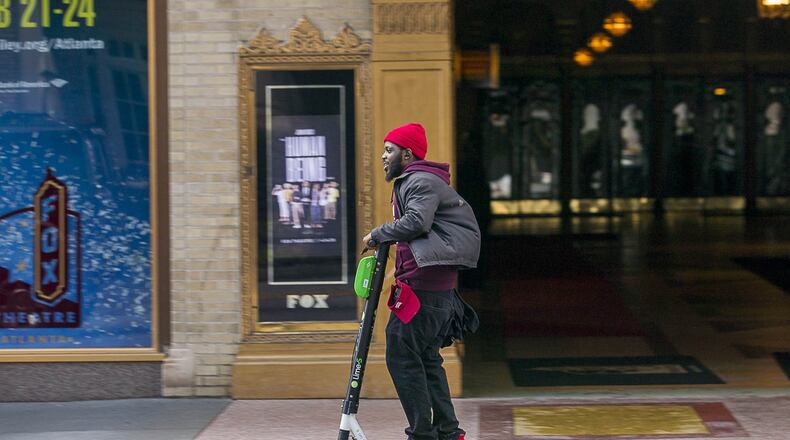As a rainbow of brightly colored electric scooters continues to crowd Atlanta sidewalks, some cities in Gwinnett County are keeping a close eye on their progress.
Leaders in two Gwinnett cities have already blocked the e-scooters from being surreptitiously stationed on sidewalks overnight, as is the strategy of multiple brands that have entered the metro Atlanta market. Others are taking time to observe how neighboring municipalities deal with the e-scooters, which are currently subject to little, if any, regulation.
READ | Which metro Atlanta cities have banned e-scooters?
The devices are available for rent via a smartphone app by anyone who happens upon them on a sidewalk. Companies including Bird, Lime, Uber and Lyft already operate in Atlanta. While suburbs like Brookhaven have approved their use, Marietta has banned them.
Two pieces of legislation regarding e-scooters, electric bikes and other low-speed motorized vehicles were introduced in the state legislature this session, but one changed into an e-bike specific bill and the other was not passed. Leaders in Gwinnett cities that have restricted scooter usage have cited a lack of state regulation as a reason for stopping the e-scooters before they start in the suburbs.
“Our concern at this time is not putting in legislation that we’re going to have to change if state legislation comes along,” said Snellville Mayor Pro Tempore Dave Emanuel.
There was no indication e-scooters were coming to Snellville when the city passed a year-long moratorium in March, but members of City Council wanted to be proactive and prevent the need to react quickly if they showed up unexpectedly, Emanuel said.
Companies that entered the e-scooter market early, like Bird, initially brought e-scooters to cities unnanounced and without consulting local governments. The city of Atlanta, where this approach was taken, passed legislation in January requiring companies to obtain permits to operate the devices and regulating how they should be stored on public sidewalks.
The issues of no-warning e-scooter drops and sidewalk clutter were two driving factors for Snellville’s moratorium.
“We didn’t want somebody to come in and drop 50 of them on the sidewalks in Snellville and we couldn’t figure out what to do from there,” said Mayor Barbara Bender. “If anyone drops one off now, the police can pick it up and impound it.”
The sidewalk concern was shared by Norcross Mayor Pro Tempore Andrew Hixson, who is also the board chair for PEDS, an organization that advocates for walkability in Georgia cities. Norcross has particularly narrow sidewalks, Hixson said, and e-scooters being parked or ridden on them increases danger to pedestrians.
Norcross passed a ban on e-scooters in March, but the city would be open to reversing that ban if state legislation was passed or the e-scooter companies agreed to use geo-fencing — technology that would prevent e-scooters from operating in specific locations — and recognize “no-scooter zones” like playgrounds and heavy pedestrian areas.
But Norcross and Snellville are in the minority among Gwinnett’s cities. Cities including Peachtree Corners and Duluth have not introduced any e-scooter legislation, nor has the county commission, and Lawrenceville plans to observe neighboring municipalities’ action involving e-scooters in the coming year, City Manager Chuck Warbington said.
Lawrenceville is building a connecting corridor between its downtown and Georgia Gwinnett College, and e-scooters could potentially operate in that area, Warbington said.
Whether they have taken action or not, the prevailing attitude among local leaders is “wait and see.”
“We’re not going to do anything (else) until we get complete information,” Emanuel said of the Snellville moratorium. “A lot of things come along and all of a sudden it’s the greatest thing since sliced bread, and a year later they’re gone or not turned out as anticipated.”
Where are e-scooters regulated in metro Atlanta?
The following cities have taken action on dockless shareable devices, such as e-scooters and electronic bikes:
• Atlanta: Imposed rules on where scooters can be placed and requires companies to obtain permits• Alpharetta: Set to approve a 12-month ban May 28 so city staff can come up with best practices
• Athens-Clarke County: Approved a 12-month ban while the consolidated government comes up with rules for the devices.
• Brookhaven: Passed an ordinance that allows companies to operate 50 dockless scooters each, and regulates how they should be used and parked.
• Decatur: In the process of drafting an ordinance to address scooters. However, the city has an interim operating agreement with Lime that spells out where users can ride and park them. It also limits companies to operate no more than 75 scooters in the city. Riders must wear helmets and be at least 18 years old.
• East Point: Plans to discuss in June creating a plan to regulate the scooters.
• Lawrenceville: Has concerns about the scooters, but will be watching to see what other cities do over the next 12 months.
• Marietta: Approved a ban on all shareable dockless devices.
• Norcross: Implemented a ban in March that makes operating, offering for use or leaving e-scooters in the city illegal.
• Roswell: The city’s Community Development and Transportation Committee asked city staff to monitor the number of e-scooters in the city. The committee said an ordinance wasn’t needed at this time.
• Snellville: Imposed a 12-month moratorium on allowing e-scooters.
• Woodstock: Approved the first reading of a proposed ordinance that would ban them in the city. If approved at the June 10 Council meeting, the change would go into effect July 1.
Like Gwinnett County News on Facebook | Follow us on Twitter and Instagram
Stay up to the minute with breaking news on Channel 2 Action News This Morning
About the Author
The Latest
Featured

